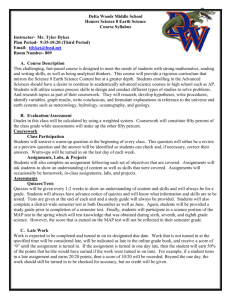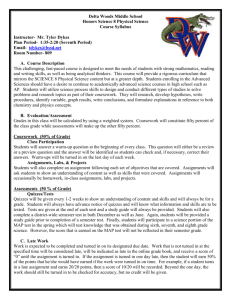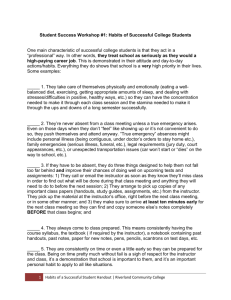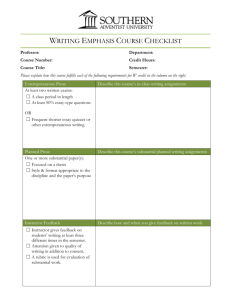Syllabus
advertisement
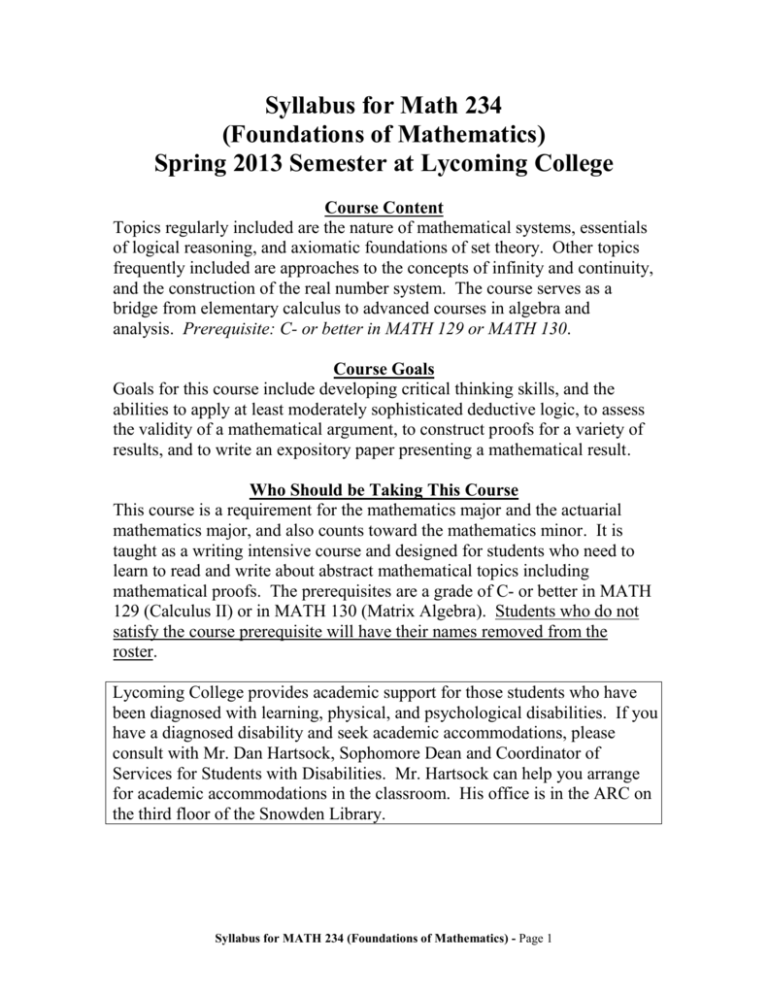
Syllabus for Math 234 (Foundations of Mathematics) Spring 2013 Semester at Lycoming College Course Content Topics regularly included are the nature of mathematical systems, essentials of logical reasoning, and axiomatic foundations of set theory. Other topics frequently included are approaches to the concepts of infinity and continuity, and the construction of the real number system. The course serves as a bridge from elementary calculus to advanced courses in algebra and analysis. Prerequisite: C- or better in MATH 129 or MATH 130. Course Goals Goals for this course include developing critical thinking skills, and the abilities to apply at least moderately sophisticated deductive logic, to assess the validity of a mathematical argument, to construct proofs for a variety of results, and to write an expository paper presenting a mathematical result. Who Should be Taking This Course This course is a requirement for the mathematics major and the actuarial mathematics major, and also counts toward the mathematics minor. It is taught as a writing intensive course and designed for students who need to learn to read and write about abstract mathematical topics including mathematical proofs. The prerequisites are a grade of C- or better in MATH 129 (Calculus II) or in MATH 130 (Matrix Algebra). Students who do not satisfy the course prerequisite will have their names removed from the roster. Lycoming College provides academic support for those students who have been diagnosed with learning, physical, and psychological disabilities. If you have a diagnosed disability and seek academic accommodations, please consult with Mr. Dan Hartsock, Sophomore Dean and Coordinator of Services for Students with Disabilities. Mr. Hartsock can help you arrange for academic accommodations in the classroom. His office is in the ARC on the third floor of the Snowden Library. Syllabus for MATH 234 (Foundations of Mathematics) - Page 1 Instructor(s) Name Office Location Office Hours * Dr. Gene Academic Mon 4:00-4:30pm (B302) Sprechini Center D311 Tue 10:00-10:30am (D311) Wed 4:00-4:30pm (B302) *You may of course also see your instructor by appointment Office Phone (570) 321-4288 Tutoring General Tutoring in this course is not available for this semester. Required Materials Each student must have a copy of the textbook: A Transition to Advanced Mathematics, 7th edition, by Douglas Smith, Maurice Eggen, and Richard St. Andre (ISBN 13: 978-0-495-56202-3) a three-ring binder containing copy of this syllabus, the course schedule, class notes, completed assignments, etc. (Note: Since students will need to use this binder every day in class and will be allowed to use this binder for exams, the binders should be kept up-to-date and complete.) a calculator (preferably a TI-84 calculator, but almost any calculator will be satisfactory) Course Links Course Schedule A Useful Trigonometry Review General Tutoring Syllabus for MATH 234 (Foundations of Mathematics) - Page 2 Grading Item Homework Assignments and Writing Assignments Point Values and Policies Homework assignments and/or writing assignments are given at the end of each class; the assignment(s) due for the following class is announced and is posted in red the course schedule. The total number of possible homework assignments points for the semester is 250, and the total number of possible writing assignments points for the semester is 250. Since this is a W (writing-intensive) course, there will be several formal writing assignments (at least 10 pages) and informal writing assignments (at least 15 pages) throughout the semester. Due dates and assignment descriptions are available from the course schedule. Late work is never accepted for any reason. If within 24 hours a student gives a legitimate reason (as judged by the instructor) for not submitting an assignment on time, an alternative assignment and due date may be given to allow student to earn the missed points; assignments not submitted should be completed for practice and answers checked with a classmate, a tutor, or the instructor. A student who misses submitting more than 10 homework assignments or 10 writing assignments automatically fails the course. Semester Four semester tests are given, one about every three or four weeks; specific Tests dates are available from the course schedule. Each semester test is worth 100 points, so that the total number of possible test points for the semester is 400. For each missed test, a grade of zero is recorded, unless (1) the instructor is presented with documented evidence of a medical reason for not completing the test at the scheduled time, and (2) arrangements to make up the test are made within 24 hours of the originally scheduled exam time. While each test covers primarily the course material for the two or three weeks prior to the test, test questions may come from any previously covered material (i.e., each test could be considered cumulative). Final Exam The final exam (administered during final exam week) is worth 200 points. Attendance The final course grade percentage is reduced by 4% for each unexcused absence after the third unexcused absence; an absence is considered to be excused when the instructor accepts an email from the student explaining the reason for the absence. It is the student’s responsibility to find out what was missed in class and keep up with the coursework. Students can get a copy of class notes from the instructor, from a tutor, or from a classmate. A student with more than 10 unexcused absences automatically fails the course. continued Syllabus for MATH 234 (Foundations of Mathematics) - Page 3 Grading (continued) Item Point Values and Policies A total of 1200 points can be earned. The final course letter grade is determined from the percentage of points earned out of the total number of possible points, as follows: A = above 93.33% A– = 90% to 93.33% B+ = 86.67% to 90% B = 83.33% to 86.67% B– = 80% to 83.33% C+ = 76.67% to 80% C = 73.33% to 76.67% C– = 70% to 73.33% D+ = 66.67% to 70% D = 63.33% to 66.67% B– = 60% to 63.33% F = below 60% Tips for Success in This Course (1) Keep up with the homework - understanding every homework assignment as completely as you can is the key to grasping the course material. Even though there will be some homework assignments that you may not be required to submit, do them anyway, since they will help you master the material. Check all your homework answers with a tutor before submitting an assignment. (2) As part of your preparation for tests and the final exam, do all exercises suggested for practice by the instructor, and start working on these early; don't wait for the night before the test or exam. (3) Get your questions answered quickly by the tutor, the course instructor, or a classmate. (4) Keep your binder up-to-date and well-organized. General Standards and Policies All work submitted must be of professional quality. All paper must be neat, without ragged edges, rips, tears, smudges, stains, etc. All answers must be clear, complete, and concise; handwriting must be legible. If the instructor can't read it, it's wrong. Assignments may be down-graded if these standards are not met. It can be very helpful for some students to work together on daily assignments and to study together; this is encouraged when it does not result in one student simply copying another's work with no understanding. Acts of academic dishonesty will result in a grade of F for the course, and a letter to the Provost describing the circumstances. If you are having problems in the course, talk to the instructor; don't involve yourself in academic dishonesty. With each assignment submitted, students are expected to write Syllabus for MATH 234 (Foundations of Mathematics) - Page 4 a short note at the end of the assignment indicating from whom help was received and to whom help was given (but this does not affect the grade for the assignment). The following is from the FACULTY HANDBOOK in the section titled Student Course Load: "It is expected that students will spend, in preparation for courses, two hours of study time outside the classroom for every hour of credit in the classroom." This means that you should be prepared to spend, on average, eight hours per week outside of class working on a four-credit course; however, this will vary from student to student and from course to course. Your time will be spent reading the text, reviewing class notes, and completing homework exercises. If you encounter a problem while working on assignments, do not spend more than 20 or 30 minutes trying to solve the problem; if you cannot solve a problem in 20 or 30 minutes, even with the help of a tutor or classmate, work on something else and show the problem to the instructor of the course as soon as possible. Syllabus for MATH 234 (Foundations of Mathematics) - Page 5





